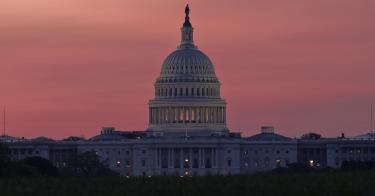Would you say that “democracy in the United States is under threat”? If so, you’re not alone. A January 11 poll found 74% of voters agree with you.
No doubt these responses are a result of the violence we’ve been seeing regularly since last summer, culminating in the sight of the U.S. Capitol being overrun on Jan. 6, which raised the national anxiety level over the inauguration. We don’t have a pause button that allows us to consider the import of current events as they happen, so we have to look backward to help us understand a path forward.
In his second inaugural address, Ronald Reagan said, “Let history say of us, ‘These were golden years—when the American Revolution was reborn … with heart and hand, let us stand as one today: One people under God determined that our future shall be worthy of our past.”
Unfortunately, Americans’ knowledge and understanding of the past are in a dismal state. A RAND Corporation survey from 2019 finds that just 32% of K-12 teachers considered “knowledge of facts”—such as of the Revolution—to be “absolutely essential” to social studies, last on a list of 12 other tasks. A RAND survey from 2020, meanwhile, found most social studies teachers felt they were not “well prepared to support students’ civic development.”
>>> The New Intolerance: Critical Race Theory and Its Grip on America
Some education officials want to erase history instead of learn from it. In San Francisco, the school board voted to remove Abraham Lincoln from a high school’s name. Among the committee’s criteria for renaming is whether the decision is “grounded in social & economic justice” (sic). The committee also canceled George Washington.
If the nation’s Founding Fathers cannot pass a background check by today’s self-declared social justice warriors, imagine what they will do with your Twitter feed or your child’s social media accounts.
It is easy to cancel these individuals today, but in doing so we take for granted what our nation would be like had such courageous—and imperfect—men and women not existed.
Parents, educators and policymakers should look for ideas around which we can rebuild an understanding of our tradition of freedom and the American Dream. A new nationally representative survey of parents of school-aged children and a subset of school board members finds widespread agreement with the idea that history matters, with all its blemishes.
For example, 70% of parents and 74% of school board members agreed that “slavery was a tragedy that harmed the nation, but our freedom and prosperity represent who we are as a nation, offering a beacon to those wanting to immigrate here.”
The riots of last year and 2021 erupted over sensitive issues related to deeply-held values, but parents and school board members want schools to help students wrestle with complex ideas. More than 80% of respondents agreed that schools should “engage with character and virtue.”
>>> Feeling Guilty About Everything? Thank Critical Race Theory
Educators’ refusal to think deeply about conflicting issues will leave students ill-equipped to deal with a future that is sure to be as complicated as the past. While history instruction that leaves out slavery and the harm from Jim Crow laws is incomplete, so too are new ethnic studies materials based on the concepts of a philosophy known as “critical theory.”
Critical theory, a worldview designed by university professors skeptical of representative democracy and the rule of law, argues that society is dictated by racist power structures and casts people into groups based on skin color. According to critical theorists, we are all either oppressors or oppressed, and some people deserve fewer rights—such as free speech—than others to balance the scales. Any dissension from these beliefs warrants cancelation.
Parents and policymakers will recognize critical theory underlying current initiatives to rename schools, for example, or rioters demanding the defunding of police and school security officers. Such concepts are driving new state-sponsored K-12 instruction in California, Washington State and Connecticut, to name a few.
President Joe Biden’s choice for Education Secretary is Miguel Cardona, formerly Connecticut’s Education Commissioner, who supported the state’s new curricular materials steeped in critical theory.
Yet Cardona himself said recently, “We gain strength from joining together.” Here’s hoping, then, that he—along with policymakers at all levels—lead by example, and use history as a resource to unite Americans, not as a target-rich environment for cancelation.
This piece originally appeared in the Daily Caller




